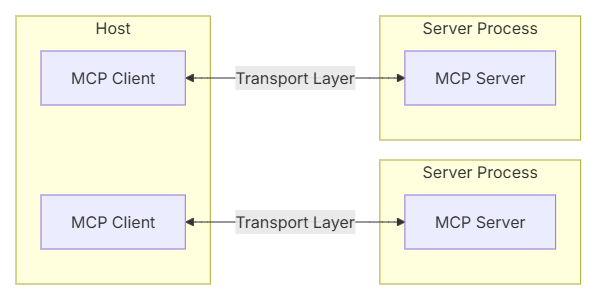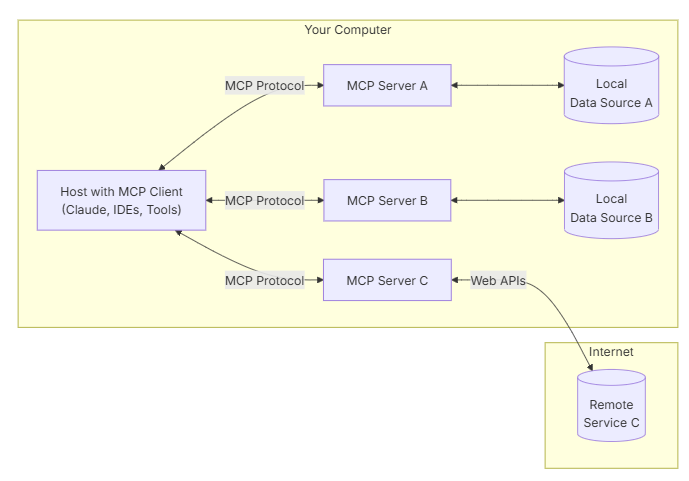Artificial intelligence agents are rapidly transforming how we interact with technology. However, one of the biggest challenges they face is accessing the right data at the right time. Enter Model Context Protocol (MCP), an open standard developed by Anthropic that enables AI assistants to connect seamlessly to external data sources and tools. Think of MCP as the USB-C of AI integrations, providing a universal interface that allows AI models to interact with platforms like GitHub, Notion, Google Drive, and more.
⁉️ What is MCP?
MCP (Model Context Protocol) is designed to enhance AI capabilities by automating the way large language models (LLMs) access context. Traditionally, AI systems require custom APIs and integrations to fetch data from different platforms. MCP standardizes this process, allowing AI agents to retrieve and process information dynamically, leading to more intelligent, responsive, and autonomous AI tools.
With MCP, AI models can:
Access real-time data from services like Slack, GitHub, or databases.
Perform actions such as retrieving documents, analyzing pull requests, or saving insights to Notion.
Switch between AI models like Claude and ChatGPT without losing context.
Ensure security through user consent mechanisms and granular data permissions.
MCP is already being adopted by companies like Zed, and Replit, proving its potential to changing AI-driven workflows, especially in software development and business automation.
🤔 Why is MCP Important?
AI models rely on context to function effectively. Without a structured method for accessing data, integrations become messy, requiring custom development for each use case. MCP solves this by offering:
Pre-built integrations: AI models can fetch data from common tools without additional coding.
Flexibility: Developers can swap AI providers without rebuilding the entire integration.
Security-first approach: Users control what data the AI can access, with explicit consent-based permissions.
Agentic capabilities: AI tools can proactively analyze, execute actions, and assist in workflows, rather than just responding passively.
For developers, MCP enables seamless interaction between AI and their tools, automating tasks like code review, document generation, and project management.
For businesses, it unlocks new possibilities for AI automation, allowing smarter customer service bots, AI-powered research assistants, and dynamic knowledge bases that stay up to date in real time.
💡 How Does MCP Work?
MCP is built on a client-server model, similar to modern API architectures. Here’s a breakdown of how it functions:
1. MCP Hosts
These are AI-powered applications (e.g., Claude Desktop, IDEs) that use MCP to fetch and process external data.
2. MCP Clients
Clients maintain 1:1 connections with MCP servers and act as intermediaries.
3. MCP Servers
These lightweight programs expose capabilities, such as reading GitHub PRs or fetching Notion pages.
4. Communication Protocol
MCP uses JSON-RPC 2.0, ensuring a structured, predictable format for data exchange.
5. Security Mechanisms
MCP enforces explicit user consent, protecting sensitive data while allowing AI models to perform powerful automated tasks.
💻 Setting Up an MCP Server: A Simple Hands-on
Ready to try MCP? Let's build a basic server that integrates Claude AI with GitHub and Notion to analyze pull requests and save summaries.
Step 1: Install Dependencies
Ensure Python 3.10+ is installed, then install the required libraries:
Step 2: Configure API Keys
Generate a GitHub token and Notion API key from their respective settings pages. Store them in a .env file:
Step 3: Build the MCP Server
Create a Python script (pr_analyzer.py) to process pull requests:
Step 4: Run Your Server
Your AI assistant can now fetch GitHub PR details, analyze them, and store results in Notion. All using MCP!
📈 The Future of MCP
MCP is poised to become the gold standard for AI integrations. As more platforms adopt this protocol, we can expect:
More AI-augmented coding assistants like GitHub Copilot.
Seamless automation for research, finance, and content generation.
Enhanced security with Detailed access controls.
Cross-platform AI collaboration, enabling smarter AI ecosystems.
With companies that are embracing MCP, its potential impact is undeniable. Whether you're a developer, business owner, or AI enthusiast, now is the perfect time to explore how MCP can revolutionize your AI workflows.









